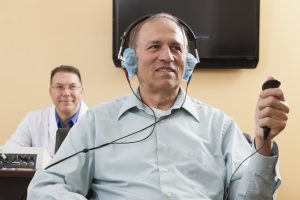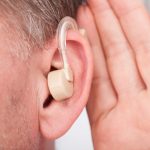 Hearing tests in seniors are an important health habit to get into, just like an annual physical examination, as these can help detect early hearing loss. If you’re over the age of 50, it’s recommended that you check your hearing every year. Why? Well, not only is there a strong correlation between aging and hearing loss, but seniors also have the highest prevalence of hearing impairment.
Hearing tests in seniors are an important health habit to get into, just like an annual physical examination, as these can help detect early hearing loss. If you’re over the age of 50, it’s recommended that you check your hearing every year. Why? Well, not only is there a strong correlation between aging and hearing loss, but seniors also have the highest prevalence of hearing impairment.
There are many types of hearing loss, and many people do not even report hearing impairment as they simply don’t notice a drastic change in their hearing. But you don’t have to lose your hearing to be diagnosed with hearing loss.
Advertisement
Hearing loss can be very subtle, so people may be living their normal lives completely unaware that their hearing is deteriorating. This is why annual hearing tests are so important. Not only can they spot changes in hearing, but preventative measures can be implemented in time to deter hearing loss.
There are many factors to consider when dealing with hearing loss in seniors. Aside from age, factors such as gender, family history, race, and occupation all play a role.
Although you may know the risks of hearing loss, without proper testing you won’t know for sure the severity of your condition.
Why are hearing tests necessary?
Hearing loss doesn’t just affect your hearing. It affects your mental state and overall well-being. Hearing loss has been tied to social isolation, which we know can greatly impact health. Hearing loss can also affect your ability to work, understand others, and enjoy life, like listening to music or even hearing the voices of your loved ones. It’s vital then to stay up-to-date with your ability to hear.
If you’re over the age of 50, get your hearing checked annually. This can gauge the level of your hearing and uncover any impairment that may develop year after year.
Although hearing loss caused by aging can’t be stopped, you can slow down the impairment. Avoiding loud noises or wearing protective ear gear can deter further hearing loss.
So if you want to preserve your hearing as you age, start adding hearing tests to your annual roster of medical exams.
How to prepare for a hearing test?
 Prior to your hearing test, the doctor may check your ear canals for earwax. A buildup of ear wax can affect your hearing – and hence the accuracy of your hearing test results.
Prior to your hearing test, the doctor may check your ear canals for earwax. A buildup of ear wax can affect your hearing – and hence the accuracy of your hearing test results.
For the test, you will be instructed to wear headphones, so you may have to remove glasses, earrings, or anything else that can prevent the headphones to from sitting comfortably on your head.
If you use hearing aids, you will be asked to remove those as well. If your doctor is conducting an auditory brain stem response (ABR) test, you will be asked to shampoo your hair prior to the test.
Types of hearing tests
There are different types of hearing tests which can quickly identify any possible hearing problems. The different types of hearing tests include:
Over-the-phone hearing checks: This test is quick. When you dial in, the test measures your ability to hear someone over the phone when there is background noise. The voice will say out numbers and you have to use your phone’s keypad to dial in the numbers you have heard.
Online hearing tests: Sounds are emitted through your computer speakers. The test works similarly to that of the phone hearing test.
Although these tests can help you assess your hearing, they aren’t enough to determine whether you need hearing aids.
Short hearing test: This is a short test done with your doctor or at a hearing clinic. It can provide insight into your hearing quality, but not quite enough to make any long-lasting decisions about future steps. A full hearing test will assess the severity of your hearing problem along with what kind of hearing problem you have.
Full hearing test: This appointment can last up to an hour and is often conducted in a hospital or hearing clinic. During this test, you will be with an audiologist who will not only ask you questions regarding your hearing, but also perform the various tests where you will have to push buttons to indicate you have heard sound.
Hearing loss test results
Advertisement
Results from the hearing test will indicate degree of hearing loss. If hearing loss is not present, then your results are normal, if hearing loss is present then it is considered abnormal. The below two charts explain normal vs. abnormal hearing test results along with a hearing loss classification table.
| Hearing test results | |
|---|---|
| Normal |
|
| Abnormal |
|
| Hearing loss table | ||
|---|---|---|
| Hearing threshold in decibels (dB) | Degree of hearing loss | Ability to hear speech |
| 0–25 dB | None | No significant trouble hearing. |
| 26–40 dB | Mild | Trouble with faint or distant speech. |
| 41–55 dB | Moderate | Trouble with conversational speech. |
| 56–70 dB | Moderate to severe | Speech must be loud. Trouble with group conversation. |
| 71–90 dB | Severe | Trouble with loud speech. Understands only shouted or amplified speech. |
| 91+ dB | Profound | May not understand amplified speech. |
As you age, hearing loss can become a greater problem, which stresses the importance of having your hearing checked annually, just like you would schedule your annual physical exam. Hearing is so much more than just being able to hear, it can have a large impact on all aspects of health, so to preserve that ability, it’s important that you have yourself checked.
